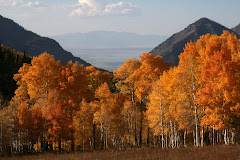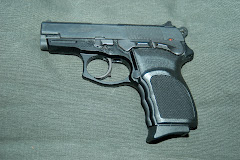1960
John F. Kennedy, Lyndon B. Johnson (D) 49.7%
**Richard M. Nixon, Henry Cabot Lodge, Jr. (R)
Incumbent Republican Dwight D. Eisenhower probably could have won a third term, but was the first president precluded by law (the 22nd Amendment) from running. I was 13 years old and this is the first election in which I took an interest. I watched the Democratic convention on TV with my parents. They supported Lyndon Johnson for the nomination. They considered Kennedy too young and more likely to "go off half-cocked." I was thrilled when Kennedy won the nomination and then the general election.
1964
*Lyndon B. Johnson, Hubert H. Humphrey (D) 61.1%
Barry Goldwater, William E. Miller (R)
I was a senior in high school when this election occurred. Goldwater struck me as a bit of a nut-job, Johnson as Southern, competent, kindly. I supported Johnson, though not enthusiastically.
1968
Richard M. Nixon, Spiro Agnew (R) 43.4%
**Hubert H. Humphrey, Edmund Muskie (D)
George Wallace, Curtis Lemay (AI)
Incumbent Johnson had decided he couldn’t win and declined to run for re-election. This was my first election, and I wanted to vote, but I didn’t like any of the candidates. Humphrey was a tax-and-spend Democrat, but Nixon gave me pause because I remember the 1960 TV debate with JFK. Nixon seemed uncomfortable, sneaky, furtive, and that perception stayed with me. He just looked sleazy, and I was uneasy with his candidacy. I voted for the candidate least likely to win, Wallace. I didn’t vote "none of the above" because I was afraid my ballot would be invalidated, and I considered the state and local elections too important to risk that happening.
1972
*Richard M. Nixon, Spiro Agnew (R) 60.7%
George McGovern, Sargent Shriver (D)
Eagleton was the original Democratic V.P. nominee but was discarded after reports surfaced that he had received shock treatment therapy for depression. Shriver was a compromise selection (after 6 others declined). McGovern’s campaign was a disaster, as he looked weak, indecisive, even incompetent. By comparison, Nixon was sleazy but clearly a competent politician. I had moved to California and forgotten to register, but if I had voted, I would have held my nose and pulled the lever for Nixon.
1976
Jimmy Carter, Walter Mondale (D) 50.1%
*Gerald Ford, Bob Dole (R)
Ford had been appointed Vice President after Spiro Agnew resigned due to legal "improprieties". He was seen as a bumbler, and he’d fallen down stairs and off stages at several public appearances, and these mishaps always made the news. The fact that his first presidential act was to pardon Richard Nixon left a bad taste in many voters’ mouths. I honestly can’t remember who I voted for. If I voted for Ford, it was unenthusiastically. If I voted for Carter, it was because he campaigned as an agent for change, and Nixon had left a taint of corruption on Republicans. It makes me uncomfortable to think I may have voted for the worst president in our nation’s history.
1980
Ronald Reagan, George H. W. Bush (R) 50.7%
*Jimmy Carter, Walter Mondale, (D)
Carter’s presidency was plagued by economic "malaise" (his own discription), a chaotic foreign policy, and his inability to provide strong leadership. He was seen as weak, indecisive and incompetent, mostly because he was all of those things. He’s viewed by many as the worst president of this period, perhaps even the worst in our history. His administration abandoned the Shah of Iran, whose government was replaced by the mullocracy which has fostered so much chaos in the Middle East. Since he wasn’t Jimmy Carter, I voted enthusiastically for Reagan.
1984
*Ronald Reagan, George H. W. Bush (R) 58.8%
Walter Mondale, Gerraldine Ferraro (D)
Mondale was saddled with his association with the failed Carter administration and Reagan won decisively on the strength of his successful first term. I joined the landslide.
1988
**George H. W. Bush, Dan Quayle (R) 53.4%
Michael Dukakis, Lloyd Bentsen (D)
The only thing I remember about this election is when Lloyd Bentsen ambushed Dan Quayle in the vice presidential debate. Quayle had (idiotically) compared himself favorably to JFK. Bentsen licked his chops and pounced. "I knew Jack Kennedy. Jack Kennedy was a friend of mine. You are no Jack Kennedy." It was a devastating slap-down, but Quayle got the last laugh, because he became vice president. Bush was no Ronald Reagan, but on the other hand, he was no Michael Dukakis either, so he got my vote.
1992
William Jefferson Clinton, Al Gore (D) 43%
*George H. W. Bush, Dan Quale (R)
Ross Perot, James B. Stockdale (Independent) 18%
Third party candidate Perot took votes away from Bush, allowing Clinton to win. Bush had said in the previous campaign that Congress would press him to raise taxes, and he’d resist. But when push came to shove, he caved. Then Democrats ran that clip in very effective ads. It’s ironic that the Dems controlled Congress when they pressured Bush into acquiescing. It was the Dems who raised the taxes, but Bush got the blame. And I fell for it. I blamed Bush, voted for Perot, and gave Clinton the White House.
1996
*Bill Clinton, Al Gore (D) 49.2%
Bob Dole, Jack Kemp (R)
Ross Perot, Patrick J. Choat (Reform)
Dole was seen as old, tired, stodgy, and more suited for retirement than the rigors of the office of the President. Clinton, on the other hand was youthful, vigorous, charismatic (some say "slick"). I voted unenthusiastically for Dole.
2000
George W. Bush, Richard Cheney (R) 47.9%
**Al Gore, Joe Lieberman (D) 48.4
Slick Willie Clinton was a compulsive liar and a cheat who couldn’t keeps his hands to himself. His philandering was despicable, but it didn’t infuriate me as much as the lying did. I took it out on Al Gore, because I figured it was just going to me more of the same kind of duplicity in government. Obviously, I’m not the only one who felt that way. Bush won the Electoral College, even though he lost the popular vote. Democrats have been bitter and divisive ever since. Chairman of the Democratic National Committee Howard Dean exclaimed that he hates Republicans and everything they stand for, and Dems have marched consistently to that drumbeat.
2004
*George W. Bush, Richard Cheney (R) 50.7%
John Kerry, John Edwards (D)
The mainstream media openly and unabashedly campaigned for Kerry. CBS News anchorman Dan Rather ran a defamatory story on Bush’s military service in the Texas Air National Guard based on forged documents. The New York Times later defended the documents as "fake but accurate." When they lost this election, Democrats vowed to oppose anything the Bush administration advocates. They have blamed Bush for everything bad, including Hurricane Katrina, global warming, drought in the south eastern states, the bridge collapse in Minnesota and the wildfires in California. If it’s bad, it’s Bush’s fault. If anything good has happened, it’s in spite of Bush, not because of him. The Dems have consistently put their own political interests ahead of the interests of the American people and it shows.
*Incumbent President
**Incumbent Vice President
Tuesday, November 20, 2007
Subscribe to:
Comments (Atom)






